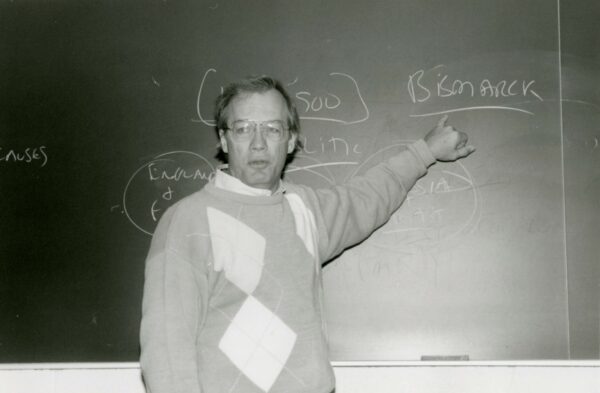
George B. Stow Jr. Photo courtesy of La Salle University Archives
On February 12, 2023, the field of medieval English history lost a significant voice with the death of George Buckley Stow Jr. In 2022, Stow became professor emeritus of history at La Salle University, where he taught for over 50 years. His meticulous research on King Richard II remains a benchmark in the study of the evolution of the British monarchy, while his demanding but compassionate teaching has been the source of student praise and lore for generations. He served as department chair and as founder and longtime director of La Salle’s graduate program in history.
Born in Camden, New Jersey, and raised under modest circumstances in Allentown, Pennsylvania, “Buck” once danced on the popular TV program American Bandstand. Following high school, he served for three years as a US Army sergeant, which, he noted, gave him the discipline that he exhibited in his academic career. Attending Lehigh University on the GI Bill, he earned a BA in classics (1967) and was inducted into Phi Beta Kappa, followed by an MA from the University of Southern California (1968). He went on to earn a PhD from the University of Illinois at Urbana-Champaign (1972), where his studies were supported by a Woodrow Wilson Dissertation Fellowship in 1970–71. While at Illinois, he laid the groundwork for his signature book, an edited edition of Historia Vitae et Regni Ricardi Secundi (Univ. of Pennsylvania Press, 1977).
Through dozens of articles and reviews in prestigious journals such as the English Historical Review and Speculum, he demonstrated the significance of Richard II. As George later noted, the heroic portrayal of Richard I (Lionheart) and the villainous picture of Richard III have tended to overshadow the more prosaic accomplishments of Richard II. Much of the scholarship in this area has centered on the role Richard might have had in inventing the pocket handkerchief. Far from trivial for George and his scholarly supporters, this innovation represented in microcosm the desire of the king to improve the hygiene of himself and the court as well as to emancipate his reign from the overweening influence of the French—whether in fashion or politics. In his attention to detail, he embodied the Rankean ideal of the scholar who “would cross an ocean to verify a comma.” Almost as a valedictory piece, George’s short article on the handkerchief controversy appeared in Real Clear History on February 14, just after his passing. For his scholarly work, he was named a fellow of the Royal Historical Society; he was also a member of the Medieval Academy of America.
Over his five decades at La Salle University, George embraced the institution’s teaching mission. In the university’s ethos of teaching students “where we find them,” and a long history of credentialing the working class of the Philadelphia region, George found an agreeable challenge in interesting students in classics and medieval history. Yet he also expanded his teaching expertise to world history, which became a foundation course in the university’s core curriculum. Sensing the need for an accessible yet sophisticated world history text, George co-authored (with Peter Von Sivers and Charles Desnoyers) the textbook Patterns of World History, now entering its fifth edition with Oxford University Press. In 2003, he won the university’s prestigious Lindback Distinguished Teaching Award.
His scholarship, pedagogy, and humanity are summed up in memorial comments by perhaps his most famous student, William Burns, the director of the Central Intelligence Agency, former assistant secretary of state, and former ambassador to Jordan and Russia:
George Stow was a remarkable scholar, a wonderful teacher, and a truly decent man. I love[d] his passion for history, his often irreverent style, and his total lack of pretension. He embodied the best of LaSalle education, and I owe him a great deal. I treasured our friendship, and will always do my best to honor his memory.
George is survived by his wife Susan, daughter Meredith, and son Jonathan.
John Rossi
La Salle University (emeritus)
Charles Desnoyers
La Salle University (emeritus)
This work is licensed under a Creative Commons Attribution-NonCommercial-NoDerivatives 4.0 International License. Attribution must provide author name, article title, Perspectives on History, date of publication, and a link to this page. This license applies only to the article, not to text or images used here by permission.